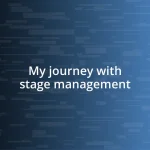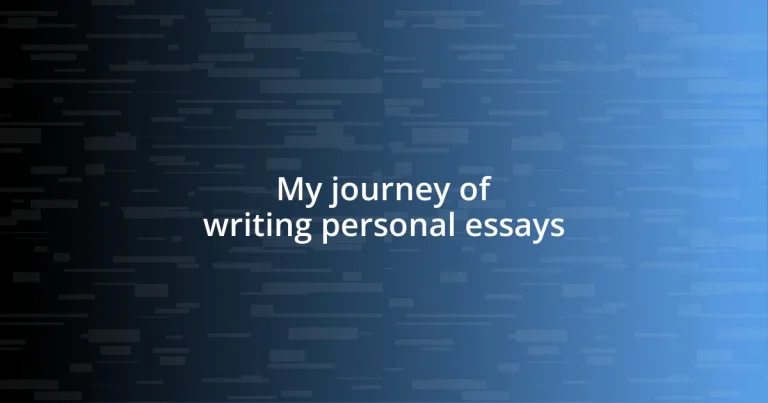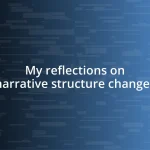Key takeaways:
- Personal essays promote self-discovery and emotional connection through vulnerability and reflection on individual experiences.
- Choosing meaningful topics and crafting engaging narratives enhances resonance with readers, utilizing sensory details and personal anecdotes.
- Feedback and community are essential for growth; embracing constructive criticism helps refine writing and fosters deeper connections with the audience.
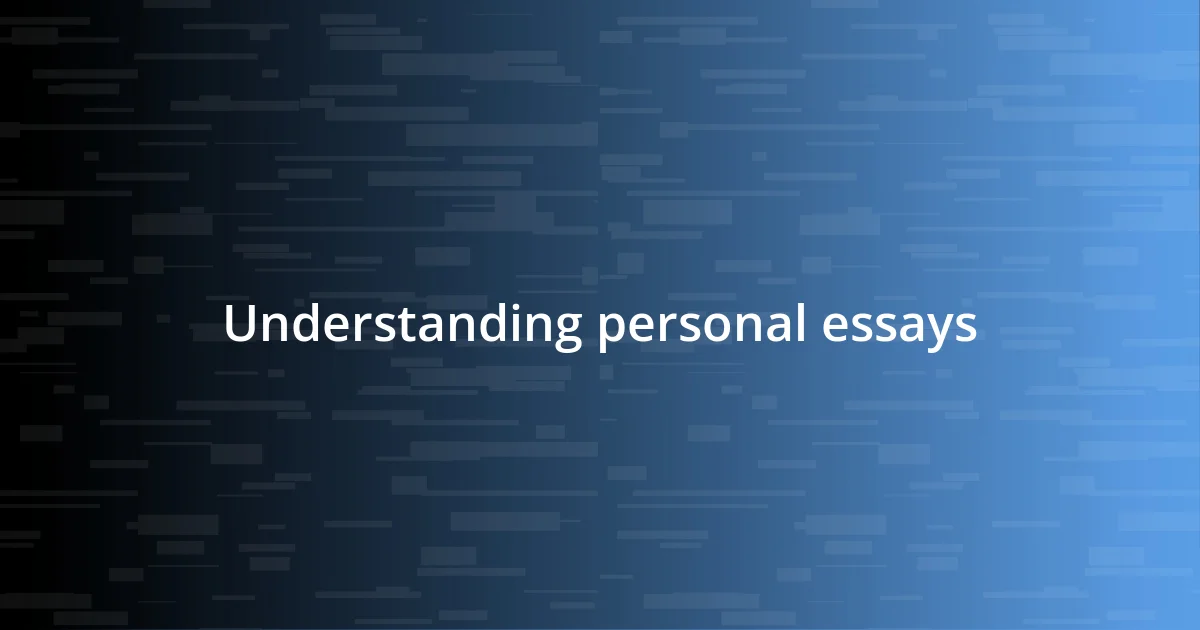
Understanding personal essays
Personal essays are a unique form of writing that allows us to delve deep into our individual experiences, thoughts, and emotions. I remember the first time I wrote one; it felt like peeling back layers of my own identity. Have you ever felt exposed yet liberated by sharing your story with others?
At their core, personal essays are about connecting with readers through vulnerability. They invite us to reflect on our lives and articulate our truths, often leading to realizations we might not have encountered otherwise. Sometimes, I find myself questioning how my experiences may resonate with others. Isn’t it fascinating how a shared moment can bridge the gap between strangers?
These essays can also serve as a powerful tool for self-discovery. When I look back on pieces I’ve written, I often see how much I’ve grown or how certain moments shaped me. It’s as if the act of writing becomes a mirror, revealing insights about myself that I hadn’t recognized before. Have you ever had a similar experience? Writing can be a journey in itself, uncovering hidden thoughts and feelings that we didn’t even know existed.

Choosing meaningful topics
Choosing a meaningful topic for a personal essay can be daunting. I usually start by reflecting on moments in my life that have left a mark—those pivotal events that shaped who I am. For instance, I once wrote about my encounter with a stranger who changed my perspective on kindness. It wasn’t just a story; it was a realization that small, everyday actions can have profound impacts on others.
Sometimes, I find it helpful to think about the emotions I want to convey. Have you ever considered how a specific experience made you feel? When I wrote about my struggles with failure, I tapped into feelings of frustration and hope. This emotional resonance not only made the writing feel authentic, but it also connected those who read it deeply to my journey.
In my experience, a good topic is often one that comes from a place of deep reflection. I remember grappling with whether to share the story of my grandmother’s passing. It was personal and painful, but the process allowed me to explore the themes of loss and resilience. That’s the beauty of personal essays; they provide a platform for exploring complex topics that might resonate with readers on a profound level.
| Criteria | Examples |
|---|---|
| Emotional Connection | Using personal anecdotes that evoke genuine feelings. |
| Universality | Topics that mirror common human experiences, such as love, loss, or growth. |
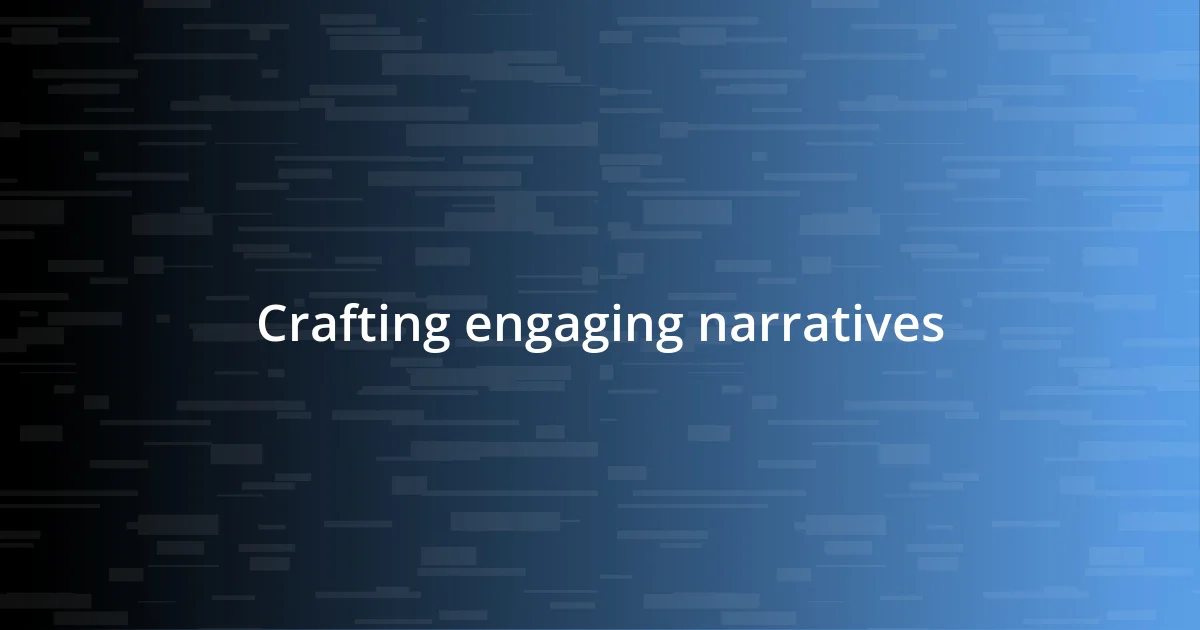
Crafting engaging narratives
Crafting engaging narratives is all about weaving a story that resonates with readers. I’ve discovered that starting with a strong hook—like a unique phrase or an unexpected moment—can draw readers in instantly. For example, I once opened an essay by describing the chaotic scene of my first day at college, with my heart racing and the overwhelming blend of excitement and anxiety. This vivid imagery allows readers to not only visualize the moment but also feel the tension I experienced.
To create a compelling narrative, here are some strategies I find effective:
- Use sensory details: Describe sounds, smells, and sights that anchor the reader in your experience.
- Incorporate dialogue: Including conversations can make your personal essay feel authentic and relatable.
- Show growth: Reflect on how the experience shaped you, giving readers insight into your journey.
These techniques not only enrich the narrative but also forge a connection with readers, inviting them into your world and encouraging them to reflect on their own experiences. It’s as if we’re sharing a moment together, creating a bond through the stories we tell.

Developing your unique voice
Developing your unique voice in personal essays is an exploration of your authentic self. I remember when I first began writing, trying on different styles and tones like outfits. It was only after experimenting with my approach that I discovered I thrive when I write as if I’m having a heart-to-heart with a close friend. How do you want your readers to feel when they finish your essay? That connection often springs from sharing my quirks, humor, and even my vulnerabilities.
Finding that distinct voice often means embracing your imperfections too. I once penned an essay about a cooking disaster that turned into a family feast. Rather than glossing over my mistakes, I highlighted the chaos, the burnt edges of the dish, and my laughter amid the fiasco. This openness not only made the essay relatable, but it also allowed my personality to shine through—showing readers that it’s perfectly okay to laugh at ourselves.
As I’ve refined my voice, I’ve learned to trust my instincts. I ask myself, “What would I say if no one else was reading this?” That question often guides me back to my core truths. It’s liberating to write without the filter of judgment and just pour my thoughts onto the page. Have you found your own way to speak freely in your writing? It’s a journey, but each step brings you closer to that unique expression that only you can offer.

Revising for clarity and impact
Revising for clarity and impact is a critical stage in the writing process. I remember my first serious draft of a personal essay when I naively thought I was done after the initial flow. However, the real magic happened when I revisited that draft with fresh eyes. It was like peeling back layers—each revision revealed spots where I could sharpen my language or tighten my narrative. Have you ever felt that rush of excitement when a simple change makes your message pop?
One technique that greatly improved my clarity was reading my essay aloud. I was amazed at how many awkward phrases and unclear passages jumped out at me! It’s as if the words took on a different life when spoken aloud, allowing me to hear their rhythm and flow. I often ask myself, “Is this sentence doing its job?” If it doesn’t contribute to the main idea or emotional arc, it often gets cut or revised. This deliberate self-questioning keeps the focus sharp and the impact strong.
The aim is always to engage readers—from the first word to the last. I recall a specific instance where I transformed a lengthy paragraph packed with details into a concise, punchy statement. The new version was like lighting a spark; it ignited excitement in my readers and left them wanting more. What’s your experience with trimming the fat? It can be tough, but that clarity is what often leaves an enduring impression.
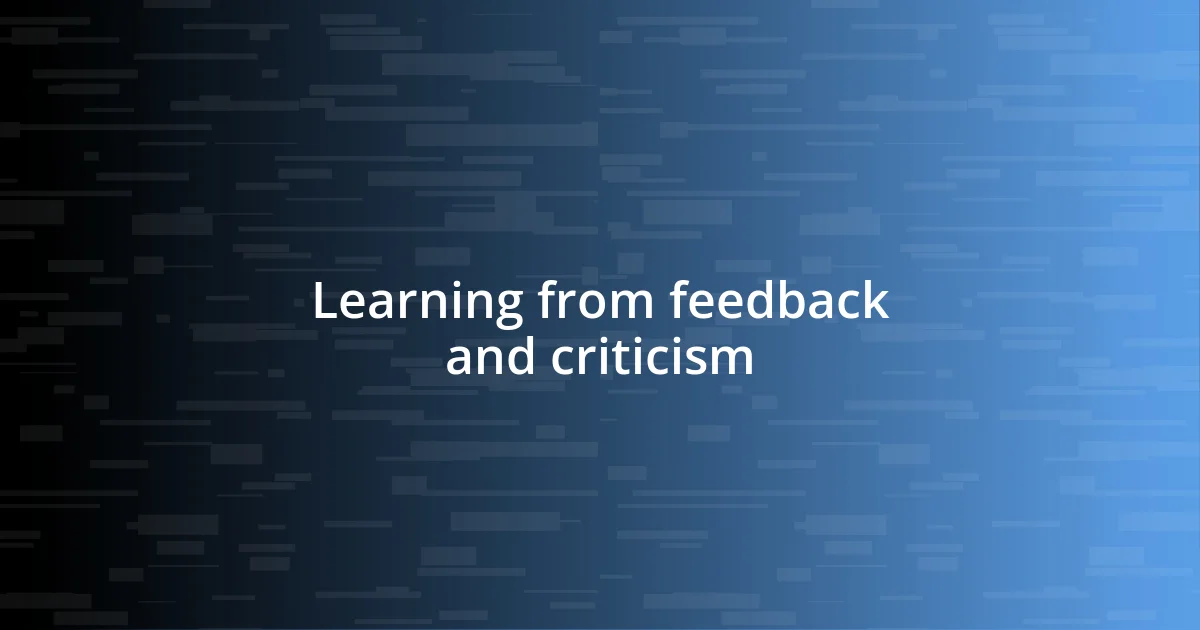
Learning from feedback and criticism
Learning from feedback and criticism is a transformative part of any writer’s journey. I vividly recall submitting an essay for peer review and receiving comments that stung initially. One reader pointed out that my main point was buried under too many tangents. Their honesty felt harsh at first, but it motivated me to re-examine how I structured my narrative. As a result, my writing became more focused and impactful. Have you ever faced criticism that initially discouraged you, only to later realize its value?
One day, a mentor offered straightforward feedback on a personal essay I had poured my heart into. She said, “It’s beautiful, but it lacks a clear direction.” Those words struck a chord. It took some time to appreciate her perspective, but I learned that constructive criticism is often a gift wrapped in vulnerability. I began to see feedback not as a reflection of failure, but as a compass guiding me to refine my thoughts and expression. Can you remember a time when criticism helped unlock new potential in your work?
I also learned to seek out feedback intentionally. During a workshop, I shared a piece that I was uncertain about. The supportive environment encouraged participants to express their thoughts candidly. Surprisingly, the discussions illuminated areas I hadn’t considered and opened new avenues for exploration. Each piece of constructive criticism became an invitation to delve deeper into my writing’s heart. How do you approach receiving feedback? In my experience, embracing it can lead to profound growth and deeper connections with readers.
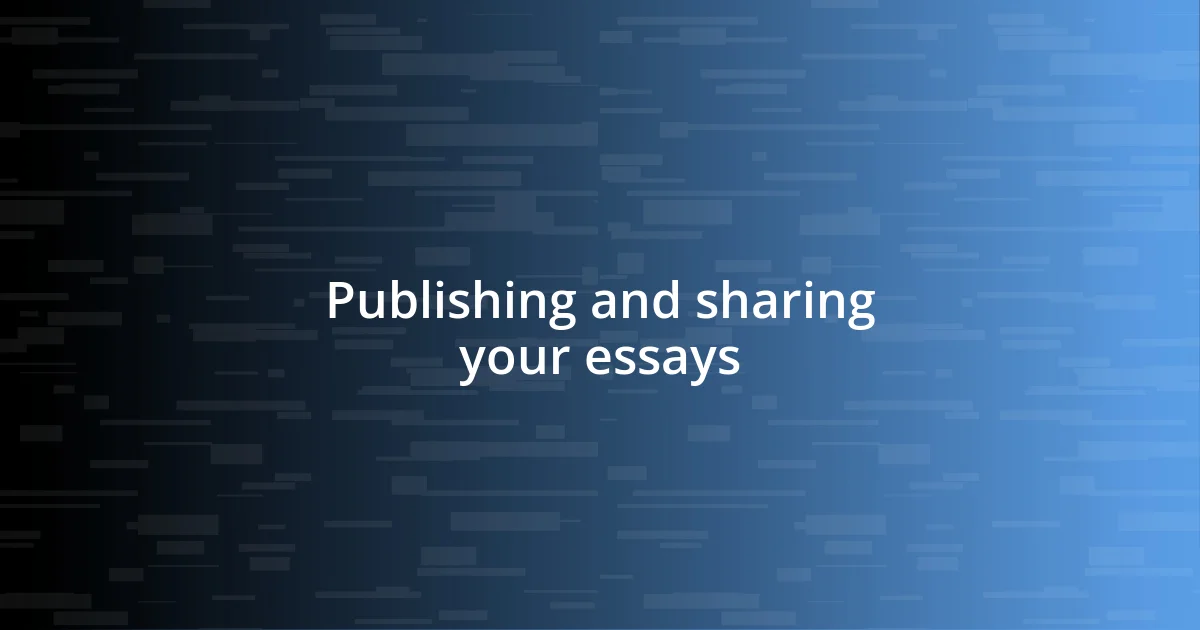
Publishing and sharing your essays
Most writers have a moment when they take the leap to share their work with a wider audience. I remember the thrill of hitting “publish” on my first personal essay online. The rush of nerves paired with excitement was almost overwhelming. Have you ever had that moment? I felt like I was releasing a piece of my soul out into the world, wondering what reactions it would evoke. The feedback from readers started pouring in, and while some were warm and supportive, others made me reconsider my writing choices. However, that feedback was invaluable—it helped me see my work through the eyes of others, revealing insights I hadn’t considered.
Social media platforms and writing communities offer fantastic spaces for sharing your essays. I was pleasantly surprised when joining a Facebook group dedicated to personal essays. The camaraderie among writers was refreshing. I found that sharing my work led to not just critiques but also encouraging conversations that sparked new ideas. It’s a reminder how vital community can be in a writer’s journey. Have you thought about how networking can fuel your creativity? I believe forging connections with fellow writers often results in a collaborative spirit that can elevate our writing.
Then there’s the beauty of submitting essays to publications. The first time I sent an essay to a literary magazine, I felt an exhilarating blend of hope and anxiety. Each submission reminded me that my voice mattered. I can recall the joyous moment I received an acceptance email; it felt like a validation of my effort and passion. What about you? Have you experienced the thrill of seeing your work published? It not only boosts credibility but also inspires confidence, pushing us to explore more topics and dive deeper into our writing journeys.








